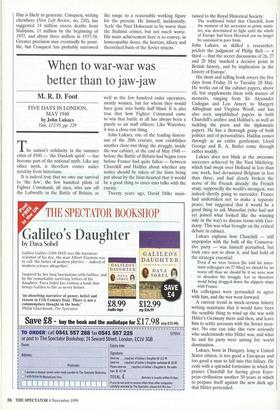When to war-war was better than to jaw-jaw
M. R. D. Foot
FIVE DAYS IN LONDON, MAY 1940 by John Lukacs Yale, £12.95, pp. 229
The nation's solidarity in the summer crisis of 1940 — 'the Dunkirk spirit' — has become part of the national myth. Like any other myth, it therefore comes under scrutiny from historians.
It is indeed true that we owe our survival to 'the few', the few hundred pilots of Fighter Command, all men, who saw off the Luftwaffe in the Battle of Britain, as well as the few hundred radar operators, mostly women, but for whom they would have gone into battle half blind. It is also true that how Fighter Command came to win that battle at all has always been a puzzle to air staff officers. Like Waterloo, it was a close-run thing.
John Lukacs, one of the leading histori- ans of the 20th century, now establishes another close-run thing: the struggle, inside the war cabinet, at the end of May 1940 before the Battle of Britain had begun even before France had quite fallen — between Churchill and Halifax about whether any notice should be taken of the hints being put about by the faint-hearted that it would be a good thing to enter into talks with the enemy.
Twenty years ago, David Dilks main-
tamed to the Royal Historical Society:
The traditional belief that Churchill, from the moment of his accession as prime minis- ter, was determined to fight until the whole of Europe had been liberated can no longer be sustained in pure form.
John Lukacs, as skilled a researcher, prefers the judgment of Philip Bell — a third — that the secret discussions of 26, 27 and 28 May 'marked a decisive point in British history, and by implication in the history of Europe'.
His short and telling book covers the five days from Friday 24 to Tuesday 28 May. He works out of the cabinet papers, above all, but supplements them with masses of memoirs, ranging from Sir Alexander Cadogan and Leo Amery to Margery Allingham and Virginia Woolf, and has also seen unpublished papers in both Churchill's archive and Halifax's, as well as tackling the press and the diplomatic papers. He has a thorough grasp of both politics and of personalities. Halifax comes through as an entire gentleman; Lloyd George and R. A. Butler come through rather muddy.
Lukacs does not blink at the awesome successes achieved by the Nazi blitzkrieg, which had swept over Holland in less than one week, had devastated Belgium in less than three, and had clearly broken the nerve of the French already: the French army, supposedly the world's strongest, was indeed shortly going to surrender. France had undertaken not to make a separate peace, but suggested that it would be a good thing to ask Mussolini (who had not yet joined what looked like the winning side in the war) to discuss terms with Ger- many. This was what brought on the critical debate in cabinet.
Lukacs explains how Churchill — still unpopular with the bulk of the Conserva- tive party — was himself perturbed, but took care not to show it, and had hold of the strategic essential:
Even if we were beaten [he told his inner- most colleagues on 27 May] we should be no worse off than we should be if we were now to abandon the struggle. Let us therefore avoid being dragged down the slippery slope with France.
His colleagues were persuaded to agree with him, and the war went forward.
A current trend in mock-serious history writing maintains that it would have been the sensible thing to wind up the war with Hitler's Germany there and then, and leave him to settle accounts with the Soviet mon- ster. No one can take this view seriously who understands who Hitler was, and what he and his party were aiming for: world domination.
Lukacs, born in Hungary, long a United States citizen, is too good a European and too good a man to fall into this fallacy. He ends with a splendid fortissimo in which he praises Churchill for having given Euro- pean civilisation another 50 years in which to prepare itself against the new dark age that Hitler portended.


























































































 Previous page
Previous page